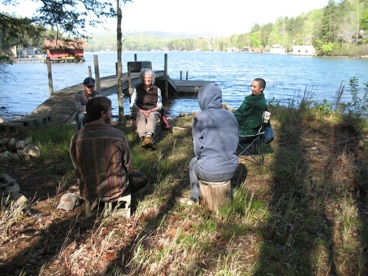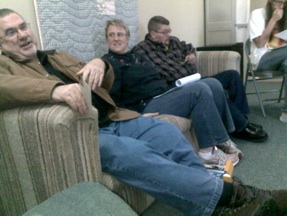Time and Format: 10:30-11:30 Silent Worship 11:45-12:30 Discussion
Worship
As an unprogrammed Meeting we have an hour of silent worship that is guided by a clerk. Other Friends Meetings are programmed and have a more typical church service that is directed by a minister and includes a sermon as well as some silent worship.
What We Do in Silent Worship
We typically begin with the Clerk indicating that it is time to enter the silence.
Silent worship is very individual and people use different techniques for seeking. Simply
put, we do something similar to meditation. Quakers often talk about "centering down."
The idea is to try to get in touch with "that of God" within you. If, from this, you get a
message, you break silence and share it with the Meeting. Shared messages are our vocal
ministry. Sometimes a message comes, but sometimes none comes. After each message given,
we leave a period of silence before the next message, for people to reflect upon what has just been
shared. Although speaking during Meeting is not conversational (no discussing, arguing the right
or wrong, or saying whether you agree with the speaker), words spoken often speak directly
to what someone else has been thinking about. Other messages may deal with the same theme,
or they may not. Sometimes it turns out that, all unplanned, there was a theme to our
worship. When everyone at Meeting seems to be concentrating together on a single issue,
or feeling, or struggle, we call it a "gathered Meeting." Toward the end of worship, the Clerk
breaks the silence and asks that we hold joys or concerns in the Light, either aloud or in our hearts.
 The Athens Meeting worship ends
when the clerk greets friends; we rise and hold hands for a moment and then break for socializing.
The Athens Meeting worship ends
when the clerk greets friends; we rise and hold hands for a moment and then break for socializing.
Quaker worship is not easy, in the sense that there is nobody telling you how to interpret spiritual readings or what to believe. Friends often prepare for Sunday worship by reading and thinking about things during the week and then contemplating those things in a worshipful manner at Meeting on Sunday. When we gather, we grow spiritually by sharing our paths and journeys with one another. Many people find this worship format comforting and nourishing to their spiritual growth. Individuals who want to hear a prepared sermon or to have rigorous guidance of their spiritual growth tend to find unprogrammed Meetings do not match their needs.
First Day School (Sunday School)
While adults engage in silent worship, we have First Day School (Sunday School) for children. In the manner of our second hour discussions (described below), we engage with children in a dynamic manner. We guide young Friends to become seekers themselves by reading religious text and/or history and then discussing how those stories and ideas relate to their everyday lives. We encourage children to express themselves through art and play activities, as well as conversationally. During the break between silent worship and second hour discussions, we have the children share with the adults what they did/learned during First Day School; this allows the community as a whole to support and encourage the children's growth as seekers.

The Second Hour of Meeting
After Silent Worship, we use the second hour of Meeting (church) to have discussions, sometimes while also having a potluck. On the first Sunday of every month our second hour is dedicated to discussing Meeting business. The other Sundays we have discussions about topics of interest to people in the Meeting; inspirational text, social action extending from our ideals and values, Quaker history and practice, etc. Hearing everyone's personal experience and understanding about the topics helps us each grow individually and as a group. Sharing our experiences is a vital part of spiritual growth for our Meeting, and is what many in the Athens Meeting consider to be the key component of a progressive Quaker process. People value that they are able to speak their mind and know they will be listened to, and respected, even if others do not agree with their ideas. In fact, it is the struggle over ideas, language, interpretations, etc., that help us grow the most because it challenges us to compare our different experiences while working toward the same goal, finding a common truth. This dynamic process allows us to continually learn, grow, and implement what we learn in our daily lives.